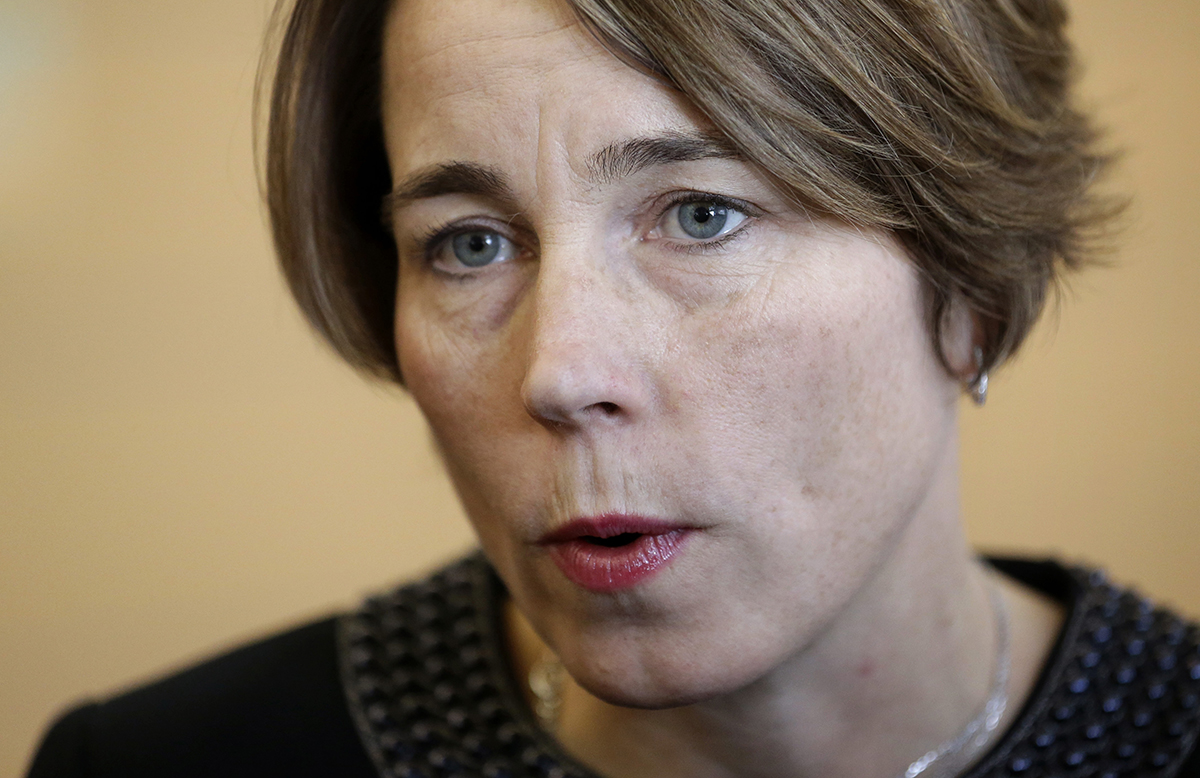While Tone on Drug War Softens, Top Massachusetts Politicians Still Oppose Marijuana Legalization

Photo via AP
Three of the most powerful politicians in Massachusetts who strongly oppose the legalization of marijuana have managed to somehow be part of the nation’s collective softening of tone in the War on Drugs.
While Gov. Charlie Baker, Attorney General Maura Healey, and Boston Mayor Marty Walsh all oppose the inevitable 2016 ballot question calling for the legalization of marijuana, they have each said, in similar terms, that they support Gloucester Police Chief Leonard Campanello’s move to treat drug addicts as people in need of health services rather than as criminals that should be locked up in jail.
Campanello’s policy experiment comes at a time when the state is grappling with an explosion in opioid abuse and drug related deaths. Their backing of Campanello’s approach is part of the state’s all out effort to address an opioid epidemic that is ravaging all corners of Massachusetts. In 2005, opioids surpassed car accidents as a cause of death in Massachusetts and, according to some measures, killed over 1,000 people in 2014 for the first time.
Not long after Campanello’s recalibration on drug policy was made public, the governor said he was open to more experimentation and new approaches to battle opioid addiction.
“I certainly think it’s an idea worth trying. I mean I’ve said for a long time that I don’t think there is a quote ‘silver bullet. I think the fact that the police chief up in Gloucester is trying something different is a good thing, and I’ll be interested to see how it works,” Baker told the State House News Service after the International Conference on Opioids at Harvard Medical School in June.
Health and Human Services Secretary Marylou Sudders went even further at the conference, stressing a need to “help decriminalize the treatment of addictions and to create access to clinical pathways” for addicts.
When WGBH’s Adam Reilly asked Baker and Sudders about the possibility that medical marijuana could be an alternative to prescription painkillers that are often the gateway to opioid addiction, the two said they did not know enough about that possibility to make informed comments.
“I don’t feel like I know about it to speak to it,” said Baker, who stated in interviews not long after his election that he strongly opposes the legalization of marijuana and would oppose any ballot question that would do so.
Boston Mayor Marty Walsh, who like Baker has made addiction recovery a central focus of his administration, has said that he is receptive to implementing a similar program in Boston if Gloucester’s experiment shows positive results. “I commend Gloucester for what they’re doing. I think it’s a great idea, a great pilot program, I’m looking forward to seeing how it works and taking that model and possibly using it here in Boston,” Walsh told Boston.com
Walsh said the possibility of starting a program in Boston like the one in Gloucester is “probably pretty good.” Meanwhile, he has been quite clear that he is not a fan of the state’s medical marijuana law or the placement of dispensaries within Boston city limits. Walsh has suggested that, if needed, he will lead the effort to oppose marijuana legalization in 2016.
Attorney General Maura Healey said on Monday that “We are not going to arrest or incarcerate our way out of this. This is a health crisis and we must treat it and address it as such.” Campanello is taking on the reality of the situation in his local community, said Healey.
“He invited people who were users, struggling, to come forward, to come to the station to help get connected with treatment, with beds. Those are lives, who knows, those people could be dead, they could have OD’d now,” said Healey.
When asked about the differences between arresting a dealer and a user, Healey said law enforcement can tell the difference between a dealer moving thousands of pills and an addict selling pills to support a problem. Healey has emphatically stated that while she is OK with decriminalization, she does not think marijuana should not be legalized in Massachusetts. She and Baker have both admitted to smoking marijuana while Walsh has said he has never tried it.


